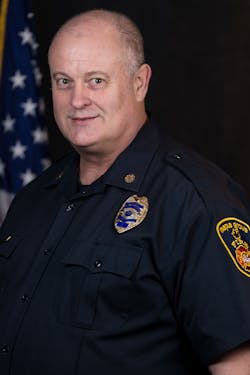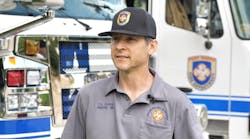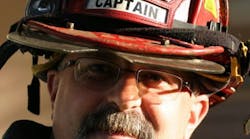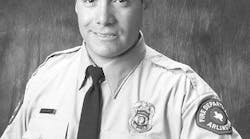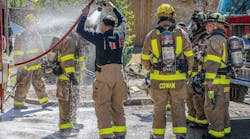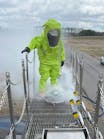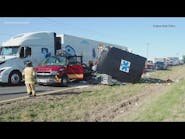“I thought it was something that happens to other people, but not me.”
—Tim Bush, Maple Grove, MN, Fire Department
Tim Bush started his career as a paid on-call firefighter with the Eagan, MN, Fire Department in 1992. In 2008, he became a “two-hatter” firefighter when he was hired as a career assistant fire chief with the Maple Grove, MN, Fire Department. He is currently the fire chief and emergency management director for the city of Maple Grove. In 2018, he was diagnosed with malignant melanoma.
How did you learn you had cancer?
In April of 2018, I completed a firefighter physical following guidelines recommended by the International Association of Fire Chiefs (IAFC) and published by Firefighter Safety Through Advanced Research (FSTAR). At that time, I received a clean bill of health. In late summer of 2018, I began to experience symptoms that I believed were associated with a hemorrhoid. I believed the situation would resolve itself given a little time and patience. When that didn’t happen, I went to my primary care provider who thought I might have a large skin tag. They referred me to a colorectal surgeon. An MRI and PET CT scans showed a cancerous tumor with lymph node involvement, and a biopsy confirmed cancer.
When you were first diagnosed, did you immediately link the cancer to your work in the fire service?
Initially, I was told to expect a squamous cell form of cancer not related to skin cancer. Minnesota has an initiative to educate firefighters about cancer, cardiac events and mental health issues facing the fire service. I knew that firefighters have a higher risk of certain cancers, so I checked several sources regarding firefighters and cancer risks. Still, I wasn’t sure about how it related to firefighting. My biopsy results, however, revealed malignant melanoma which, according to the Firefighter Cancer Support Network, is one of the types of cancer firefighters experience in greater numbers than the general population. On Dec. 3, 2018, I was told I had malignant melanoma, that it’s a very aggressive form of cancer and not curable. I had half-expected confirmation of squamous cell cancer, but this was different. I felt like I had been punched in the gut and suddenly my future looked very dark and short.
How have your brother and sister firefighters supported you since your diagnosis?
When you start cancer treatment, providers ask if you have resources for transportation, household tasks and expenses. I felt like I suddenly had 100 firefighters getting in line to offer their help. It’s very nearly overwhelming to have so many brothers and sisters in the fire service reaching out to ask what they can do to help. I was extremely fortunate because a deputy chief and a captain took charge of coordinating volunteer help. That was huge. Early on you don’t know what you’ll need and you don’t know what to tell people. At the same time there is always the possibility you will need help down the road and you don’t want to turn down offers for help, even if you have say to not now, but maybe later.
How has cancer affected your life both on and off the job?
I’m an anomaly in regards to cancer. Malignant melanoma does not respond well to chemotherapy and/or radiation. Historically, it is a killer with very few patients living beyond five years. However, more recent changes in the development of immunotherapies have been game changers in the treatment of melanoma. I don’t receive chemo or radiation, so I don’t experience the associated side-effects of those treatments. My typical treatment day has me completing a blood draw in the morning before work, then receiving an infusion of immunotherapy drugs in the afternoon. My body handles the immunotherapy treatment really well, with very little in the way of side effects. I have missed very little work, so I am still working full-time as I complete my first year of treatment.
I’m very open about my cancer journey and usually answer any questions asked of me. In turn, I have encountered fellow firefighters that have traveled on a cancer journey, but didn’t necessarily share that information. I am trying to push others to make sure they get checked by a doctor if they see or feel something that doesn’t seem right. I’m a firm believer in air management and protecting firefighters from harm. As a cancer patient, I am able to push others to take measures to minimize exposure to harmful substances. I think experiencing cancer first hand gives me greater credibility.
Is there anything you would like firefighters to know about facing cancer?
Firefighters need to know that cancer is very real. I thought it was something that happens to other people, but not me. However, the advancements in the treatment of cancer are happening at a blinding rate of speed. An oncologist at the Mayo Clinic told me that the advancements in treatment of melanoma are happening so fast, that even Mayo has a hard time keeping up. It is extremely important to select the right providers and the right treatment plan. Firefighters need to be smart about their job. That means staying out of hazard zones without proper protective equipment. Use your air not only for initial attack, but use it for overhaul and any operation that may cause exposure to aerosols, vapors and fine dusts. Decontaminate yourself before rehydrating or eating anything. It means completing gross decontamination before leaving the fire scene and cleaning turnout gear after events. Wash off potential contamination from your person as soon as possible and that includes taking a shower after responding to fires.
Although Tim is not cancer-free, his tumor is gone and his lymph nodes have returned to normal. He has an area in his throat that shows up in PET CT imagery that his team of doctors is working to figure out. He will continue immunotherapy treatment for at least six months, but it could also be as long as two more years. Watch Tim’s video interview at tinyurl.com/cancer-awareness-2019. Follow Tim’s story on his YouTube channel at https://tinyurl.com/teq3vc3.
